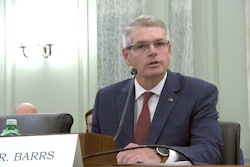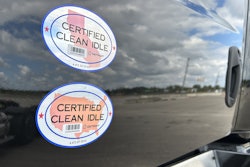Trucking news and briefs for Thursday, July 17, 2025:
Early-stage 2026 DOT appropriations bill includes parking funding, speed limiter ban
The first draft of the fiscal year 2026 Transportation, Housing and Urban Development, and Related Agencies (THUD) appropriations bill has been released and approved by the House THUD Subcommittee, clearing the way for the bill to be marked up Thursday by the full House Appropriations Committee.
Overall, the bill provides a total discretionary allocation of $89.91 billion for the covered departments, which is $4.458 billion (4.7%) below the fiscal year 2025 enacted level.
Should the bill pass with current provisions intact, among the funds allocated to the Department of Transportation -- specifically for the Federal Highway Administration -- is $200 million for public truck parking. The bill would require that the parking projects “be within reasonable access to or in the right of way of an Interstate highway, the National Highway System, or the National Highway Freight Network.”
The bill would also ban projects funded by the allocated funds from charging fees to commercial vehicle drivers to access the parking. Funding would also not be allowed to be used for the construction or development of charging or fueling infrastructure.
Among the total $89.91 billion appropriated in the bill, the Federal Motor Carrier Safety Administration would receive $927 million, which is $21 million above the FY25 enacted level.
Under the provisions of the bill, no funds allocated to FMCSA would be allowed to be used to promulgate a rule or regulation to require heavy trucks to be equipped with speed limiting devices set to a maximum speed. DOT Secretary Sean Duffy last month signaled that FMCSA will withdraw its existing speed limiter proposal.
The bill also bans the use of funds to require the use of electronic logging devices for CMVs transporting livestock or insects -- an exemption that has been in place since the implementation of the ELD rule.
It would also continue the prohibition of a requirement for driver-facing cameras to register an apprenticeship program with the Department of Labor as a condition for participation in the Safe Driver Apprenticeship Pilot Program.
Finally, the bill would protect the federal preemption determination of California’s meal and rest break rule.
House bill would add positive hair drug tests to FMCSA Clearinghouse
A bill introduced in the U.S. House would direct the Federal Motor Carrier Safety Administration (FMCSA) to add a positive hair test result to its current definition of an employer’s ‘actual knowledge’ of a truck driver’s drug use.
The bill, titled “The Drug and Alcohol Clearinghouse Public Safety Improvement Act,” would require motor carriers to promptly submit to FMCSA’s Drug and Alcohol Clearinghouse any record of a positive hair drug test result from a preemployment drug test or a random drug test that is administered through a covered device.
Any hair drug test submitted to the Clearinghouse must be from a laboratory that is accredited by the College of American Pathologists for forensic hair drug testing and incorporates, if available, Department of Health and Human Services scientific and technical guidelines for hair testing.
Rep. Rick Crawford (R-Arkansas) in introducing the legislation said, “Arkansas’s trucking industry relies on safe and efficient policies that keep our roads safe for all users of the road. Allowing U.S. motor carriers to use positive hair test results as actual knowledge for pre-employment purposes not only creates a more reliable way for drug testing but also creates a more equitable process for hiring truck drivers.”
Crawford added that the bill “enables employers to know if a licensed commercial truck driver job applicant has previously failed a hair test for illegal drug use. Removing known controlled substance users from behind the wheel of commercial motor vehicles will make our nation’s roads safer for everyone.”
Crawford noted that several trucking companies already screen applicants with hair drug tests, but this bill would allow those tests to be submitted to FMCSA’s Clearinghouse. Motor carriers would still be required to administer a pre-employment urine drug tests.
Truck Parking Club gets investment from Cat Scale Company
Truck Parking Club last week announced a strategic investment from CAT Scale, which the paid truck parking provider said “brings nearly five decades of growth and operations expertise to support Truck Parking Club's mission of solving the industry's most persistent challenge: the truck parking shortage.”
The partnership comes as Truck Parking Club has experienced explosive growth, doubling its network to 2,262 Property Member locations in just six months. With CAT Scale as a strategic partner, the company said it is positioned to accelerate toward its goal of 10,000 Property Member locations while building the level of truck driver trust.
"We're humbled by CAT Scale's investment and that they see the value we bring to drivers," said Evan Shelley, Co-founder & CEO of Truck Parking Club. "They've been stewards of the trucking industry for generations, building an incredible nationwide network and beloved brand through their unconditional guarantee. Leveraging their knowledge and experience from building a trusted nationwide network will be invaluable as we continue building our truck parking network toward our goal of 10,000+ Property Member locations by December 2026."










